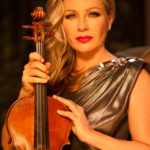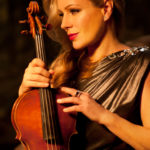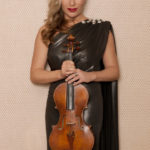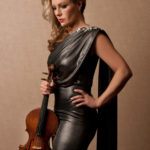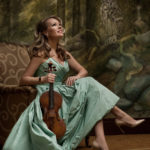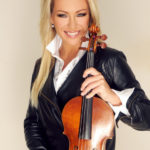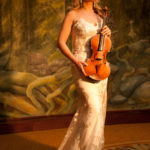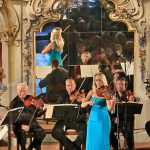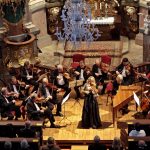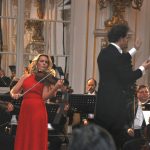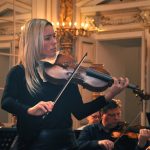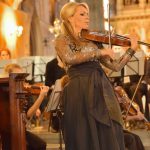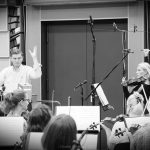-

-
 PlaylistNavigationCreditsContactCreditsPhotoshoot by Bet Orten
PlaylistNavigationCreditsContactCreditsPhotoshoot by Bet Orten
Styling: Martin Gruntorad
Make-up: Kamila Vilímková
Dress: Leeda, Chatty, Tatiana
Jewellery: Janja Prokić
Site by Lukas KotyzaSlide Back
Press & gallery
Press
14 Mar 2018
Headliner
Osobnost měsíce
Historicky první česká sólová violistka Jitka Hosprová začala hrát na housle v sedmi letech a ve čtrnácti přesedlala na violu. Z obyčejného koníčku se okamžitě stala láska a vášeň, která jí obrátila život vzhůru nohama.
8 Nov 2017
Časopis Harmonie
Fišerův Fénix v rukou Jitky Hosprové
Sedmého listopadu 2017 proběhl v Muzeu Bedřicha Smetany koncert, který by neměl v současném koncertním provozu zapadnout nepozorován. Nekorunovaná královna violy, Jitka Hosprová, si v rámci svého festivalu 2017 „Procházky uměním“ přizvala harfistku Kateřinu Englichovou a Kvarteto Martinů, aby nabídla – jako vždy na svých koncertech – pestrý program převážně z hudby druhé poloviny 20. století.
16 Oct 2017
RADIO D-DUR
JITKA HOSPROVÁ AKA VIOLKA
“My friends call me ‘Violka’ (small viola) – I guess it is quite apt because I can really identify with my instrument.” This weekend on Czech Radio D-Dur, Jitka Hosprová selects the music she likes.
26 May 2017
5PLUS2 WEEKLY
THE VIOLA PLAYER TOOK A LIKING TO MUSIC AND PAINTING IN THE PILSEN REGION
Jitka Hosprová talks about her Walking in Art Festival (Procházky uměním) in an interview for the regional edition of 5plus2 Weekly published in the Pilsen, Rokycany and Tachov regions.
11 Apr 2017
OPERA+
I HAD TO PROVE I AM NOT JUST A BLONDE SCRAPING AWAY AT HER VIOLA
The superlative Czech viola player, Jitka Hosprová, does not try to compete with violinists, as she accepts the specifics, limits and advantages of her instrument.
27 Feb 2017
Denik.cz
CONCERT OF THE PRAGUE RADIO SYMPHONY ORCHESTRA
The Prague Radio Symphony Orchestra will perform with visually impaired musicians at a concert in Prague. The concert of the Prague Radio Symphony Orchestra, which will take place at the Municipal House in Prague on Monday, will present blind multi-instrumentalist Mário Bihári, blind pianist Ráchel Skleničková and blind flautist Eva Blažková. The performance will also feature other soloists: violinist Václav Hudeček, violist Jitka Hosprová and guitar player Lubomír Brabec.
19 Jan 2017
Denik.cz
VIRTUOSITY PUT TO A TEST DURING BLACKOUT. JITKA HOSPROVÁ HAD TO PLAY BY EAR FOR 2,000 PEOPLE IN THE DARK. “I WAS LIKE A JUKEBOX”
Host do domu, 19 January 2017, 11:04 The virtuosity of Jitka Hosprová was put to a test during blackout. She played for 2,000 people without sheet music in the dark. “I was like a jukebox.” Jitka Hosprová is the first Czech female viola soloist in history.
8 Apr 2016
Opera+
SLOVAK PHILAHARMONIC WITH SVÁROVSKÝ AND HOSPROVÁ
While Hosprová was able to detach her viola play from the orchestral sound where it was needed, when a joint rhythmic articulation was required, she joined efforts with the Slovak Philharmonic to place exact accents to Berlioz’s perfectly varied rhythm.
16 Jun 2015
FirstStyle magazine
VIOLA SOLOIST JITKA HOSPROVÁ EXCELLED IN BRAZIL
The first Czech female viola soloist has returned from her successful tour of Brazil. In less than a month, she performed eight concerts at different venues. Each concert was specific; she played solo in a church, with a harp player, with a chamber orchestra and with a big symphonic orchestra.
4 Feb 2015
Supraphon
JITKA HOSPROVÁ IS THE STAR OF A NEW FESTIVAL CALLED WALKING IN ART
Jitka Hosprová is the first Czech female viola soloist in history. Her work is praised both in her homeland and abroad, and Jitka promotes the viola not only through her superlative play, but also with her erudite accompanying words at her concerts, on various radio programmes, and in many other ways. In February, the first edition of an interesting new festival Walking in Art (Hudební procházky uměním) will be launched at Museum Kampa.
9 Feb 2015
TOPVIP
JITKA HOSPROVÁ IS THE STAR OF A NEW FESTIVAL CALLED WALKING IN ART
The discography of Jitka Hosprová already comprises seven albums. And she has added another one only recently. The highly acclaimed recording features a selection of Paul Hindemith’s compositions for viola. “I also chose one of Hindemith’s most famous pieces to be included on the album. It was composed in London in 1936 while Hindemith was preparing a premiere broadcast of another of his works on BBC.”
16 Feb 2015
Opera+
JITKA HOSPROVÁ AT THE WALKING IN ART FESTIVAL AT MUSEUM KAMPA
The world-famous Museum Kampa in Prague hosted the opening ceremony of a new festival called Walking in Art (Hudební procházky uměním). The aim of the festival is to bring music, fine arts and history closer together and spice up performances of classical music with original walks through the arts.
4 Mar 2015
Harmonie
JITKA HOSPROVÁ OFFERS A STYLISTICALLY AND TECHNICALLY PERFECT RENDITION OF HINDEMITH’S SONATAS
Paul Hindemith’s instrumental compositions do not form the core of the Czech soloists’ repertoire, which is a shame because they are exciting, structurally interesting and melodic pieces of music. Besides, they are instrumentally varied.
18 Sep 2015
Lidovky
VIOLA, THE INCONSPICUOUS BEAUTY
The sound of its name is beautiful and comforting. If we want something to express sympathy and soothe the sorrows, we rather think of viola than violin. Of course, the higher-pitched violin is mostly dominant. It can be heard better and has a sharper sound, which is why of the two instruments, the viola gets less attention.
8 Oct 2014
The Strad
Hindemith
Arriving at the tail-end of numerous recordings marking last year’s 50th anniversary of Paul Hindemith’s death, this CD presents some of his best-known viola compositions. As the informative but not always accurately translated booklet notes rightly observe, the composer wrote them for his own use as a concert soloist, and they thus give a fair impression of his playing style, which was imbued with the principles of the post-Romantic ‘New Objectivity’.
1 Oct 2014
Gramophone
HINDEMITH Viola Works
Competition is hotting up in Hindemith’s viola sonatas. They have fared better than most of his works in this genre, with a platoon of viola players vying on disc which I surveyed in brief when reviewing Tabea Zimmermann’s recent complete recording (5/14), which set the new benchmark.
6 Jun 2014
TV Prima
JITKA HOSPROVÁ ON JAN KRAUS SHOW
The guests of the 171st episode will be: Karel Fiala, Jitka Hosprová and Ondřej Hrab. You can be part of the audience during the shooting of the show on Tuesday, 3 June, in the Prague theatre Archa. The episode will air on Friday, 6 June, after 10 PM on TV Prima.
16 March 2012
NOVINKY.CZ
VIOLA PLAYER JITKA HOSPROVÁ: THE ALBUM CHANSON DANS LA NUIT IS NOT ONLY FOR MOTHERS
Violist Jitka Hosprová and harpist Kateřina Englichová have recorded a new album “Chanson dans la Nuit”. The two musicians and their instruments teamed up during the Czech Philharmonic’s concert cycle for mothers-to-be.
1 Aug 2011
Gramophone
Unusual Czech repertoire for viola, passionately played
Lacking as they do the extensive Classical and Romantic solo repertoire enjoyed by violinists and cellists, viola players are often on the lookout for new pieces. Jitka Hosprová has put together an interesting programme of Czech music and gives convincing accounts of all five works, distinguished by fine, robust tone and emotional commitment.
8 Jul 2011
International Record Review
Monologue
One of the uncontracted benefits of reviewing is being sent music you don’t know; I knew the names of all the Czech composers here and had heard some, not much, music by them, and so this CD has been a voyage of discovery for me.



